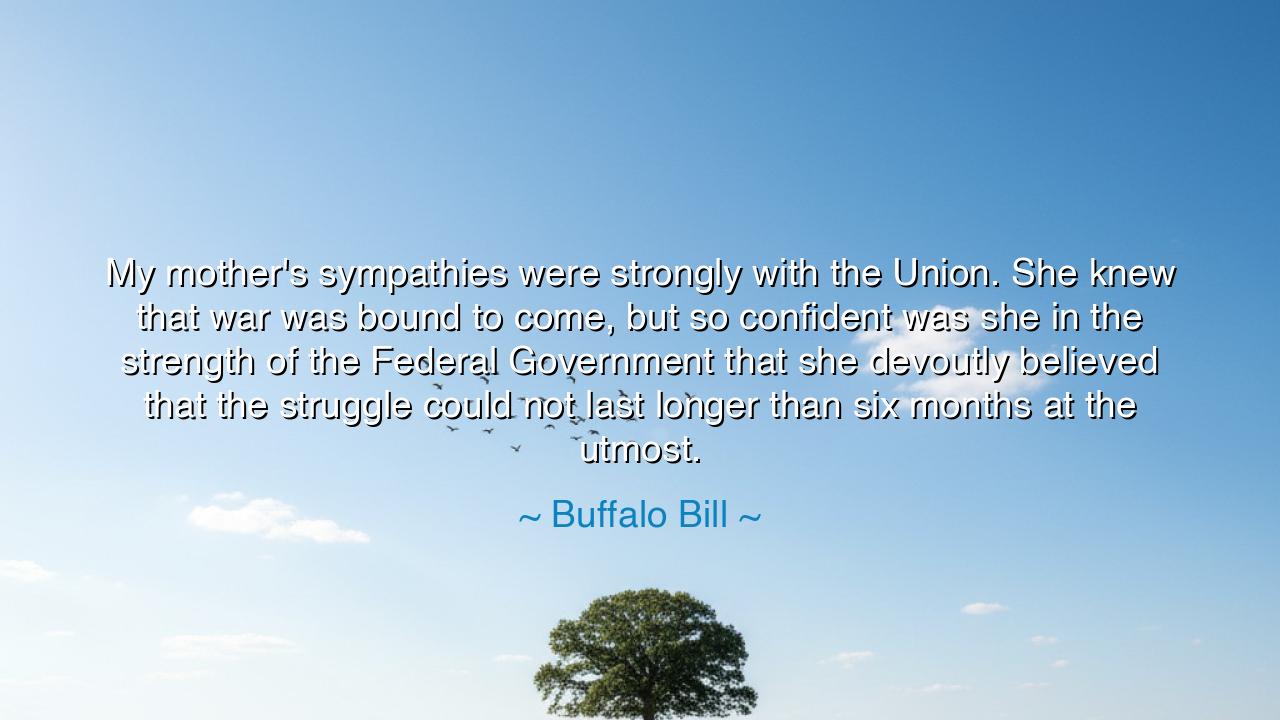
My mother's sympathies were strongly with the Union. She knew
My mother's sympathies were strongly with the Union. She knew that war was bound to come, but so confident was she in the strength of the Federal Government that she devoutly believed that the struggle could not last longer than six months at the utmost.






When Buffalo Bill declared, “My mother’s sympathies were strongly with the Union. She knew that war was bound to come, but so confident was she in the strength of the Federal Government that she devoutly believed that the struggle could not last longer than six months at the utmost,” he bore witness not only to the spirit of his mother, but to the fierce hope and tragic miscalculation that gripped an entire people on the eve of the Civil War. His words remind us that war is rarely what men and women expect it to be. The faith of the innocent often envisions a swift conflict, a short trial, yet history reveals that wars, once unleashed, take on a terrible life of their own, stretching beyond the bounds of hope or imagination.
The origin of this belief lies in the confidence of the Union’s citizens, who trusted in the strength of the Federal Government, its resources, and its numbers. Many, like Buffalo Bill’s mother, could not imagine that rebellion could endure against such power. They saw the conflict as a brief storm that would quickly scatter, and they placed their faith in the Union’s might to restore order with little delay. But this faith, though noble, proved blind to the depth of passion, the resilience, and the desperation that fuels civil war. For when brother rises against brother, no calculation of strength alone can measure the cost.
History offers countless parallels. At the dawn of the First World War, Europe’s leaders and citizens alike declared with confidence that the fighting would be over “by Christmas.” Young men marched to the front with smiles, believing they would soon return home triumphant. Yet what followed was four years of slaughter, trenches filled with mud and blood, and a generation scarred forever. Buffalo Bill’s mother, like those hopeful citizens of 1914, represents the timeless human tendency to underestimate the fury of war, to imagine it shorter, kinder, less enduring than it truly becomes.
The meaning of his words also rests in the courage of women, who, though they may not have fought on the battlefield, bore the war in their hearts, their homes, and their prayers. His mother’s sympathies with the Union reveal her strength of conviction, her alignment with the cause of unity and freedom. Yet her belief that the conflict would be short speaks to the innocence of one who had not yet seen the abyss of prolonged war. She carried hope as a shield, even as the nation descended into years of bloodshed.
The lesson we must take is sobering: never underestimate the gravity of conflict, nor believe that the strength of arms alone will swiftly settle divisions born of deep passion and belief. Wars are not mere contests of numbers or machinery; they are struggles of human spirit, and when two sides fight with conviction, the outcome is measured not only in victory but in suffering and endurance. Buffalo Bill’s memory of his mother teaches us both the nobility of her faith and the danger of misplaced expectation.
What, then, should you do? First, when confronted with conflict—whether personal, social, or national—do not dismiss it lightly or assume it will pass quickly. Prepare your spirit for endurance, for true struggles are rarely short. Second, when you hold convictions, hold them with both strength and humility, recognizing that even the mightiest causes will demand sacrifice. Third, cultivate sympathy, as his mother did, for sympathy roots conviction in humanity and not in hatred.
Thus, let Buffalo Bill’s remembrance echo as teaching: “My mother’s sympathies were strongly with the Union.” Her faith was admirable, her hope noble, but history teaches us that wars are longer, bloodier, and more tragic than the hearts of the innocent can bear to imagine. Let us honor her courage, but also learn from her miscalculation, that we may face conflict with clear eyes, sober hearts, and a commitment not only to victory, but to the preservation of peace wherever it may be kept.






AAdministratorAdministrator
Welcome, honored guests. Please leave a comment, we will respond soon